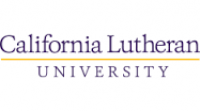






The physics curriculum at California Lutheran University addresses the question of how and why things work, from the forces which govern subatomic particles to the large-scale phenomena which shape our universe as a whole. The fundamental nature of physics accounts for its relevance not only in engineering and technology but also in the life and earth sciences. The various introductory courses offered by the Physics Department are thus tailored to meet the different needs of physics majors, students in other sciences and liberal arts students, in particular future teachers. The physics faculty members use a blend of interactive lectures, illustrative demonstrations and hands-on laboratory exercises to enhance students’ comprehension of the material. Cal Lutheran offers both the bachelor of science and bachelor of arts in physics, as well as a physics minor. The B.S. program is well suited for students interested in graduate studies in physics or engineering or in careers in industry. The B.A. is a more liberal physics degree, where students can explore the relationship of physics with another field of interest. Beginning physics students gain a strong background in classical physics, modern physics and applied mathematics. Upper division courses focus on both theoretical topics and experimental techniques. These small upper division classes, together with close supervision by the faculty, provide a uniquely personalized learning experience for the students. Physics facilities include a teaching laboratory with networked workstations, an optics laboratory with a full-size optical bench and a variety of lasers, an atomic force microscope and a scanning electronic microscope. In addition a bioengineering laboratory contains experimental resources for biomaterials research. Physics also owns an eight-node linux cluster for use in parallel numerical simulations. Physics students are encouraged to become actively involved in undergraduate research. Cal Lutheran students have worked on projects in fluid dynamics, biomedical engineering, laser medicine, nuclear radiation and digital communication. Current research interests of the physics faculty include fluid dynamics, complex systems, bioengineering and electronics. Senior physics majors participate in original research work that culminates in a research paper. Physics majors often participate in summer undergraduate research programs as well as internships with local industries. Physics graduates easily find employment and those who opt to continue studies in graduate school are accepted into programs at universities throughout the nation.
| Number | Duration |
|---|---|
| 4 | year |
Employers value the wide-ranging technical skills and problem-solving capabilities of physics majors. Technology firms, research laboratories, educational institutions, and the military regularly hire Cal Lutheran physics graduates. Before pursuing their careers, many of our students attend graduate programs for physics, engineering, computer science, mathematics, or optical science. Pursuing business, medicine, or law degrees are also viable options. Physics majors score well on the MCAT and LSAT, the entrance exams for medical school and law school. Career paths include- Optical Engineer Mechanical Engineer Computer Hardware Engineer Aerospace Engineer Petrophysicist Software Engineer Entrepreneur Lawyer Radiation Health Officer High School Physics Teacher